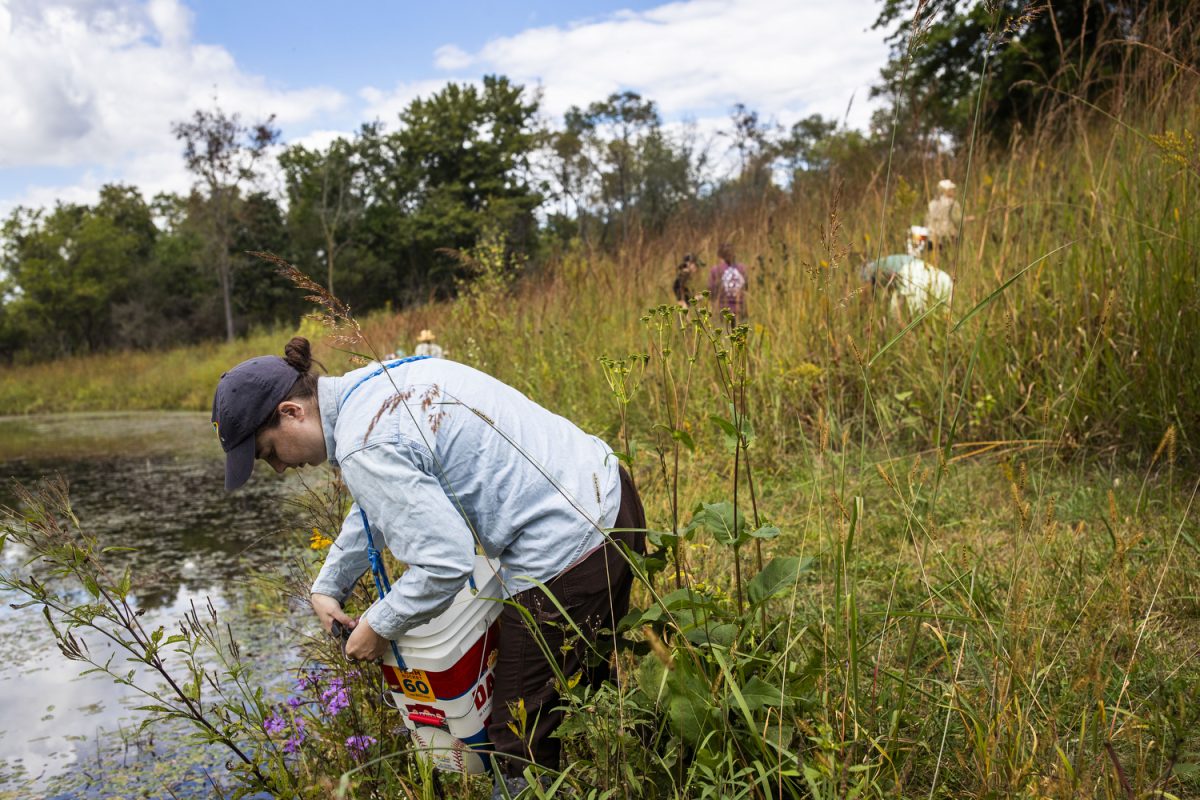Community members harvest seeds at the Conservation Education Center at Kent Park in Johnson County on Wednesday, Sept. 25, 2024.
Volunteers hiked toward the fishing pond led by Johnson County Education Specialist Kristen Marrow. The seeds collected during the harvest will be used for ecosystem restoration projects across Johnson County.
As pollinator habitats continue to decline on the national level, Johnson County Conservation is participating in Project Wingspan — a multi-year initiative by the Pollinator Partnership aimed at restoring ecosystems across the Midwest and Great Lakes regions — for the first time.
Through this collaboration, volunteers participate in prairie seed harvests on Johnson County Conservation land, with the collected seeds designated for regional habitat plantings identified by the Pollinator Partnership, the world’s largest nonprofit dedicated to pollinator protection and ecosystem preservation.
Acting Director of the Conservation Board Bradley Freidhof said protecting and enhancing prairie plants native to the region is crucial in protecting pollinators.
“We’ve modified the habitats greatly. Even our own yards, they’re not great places for insect populations,” Freidhof said. “Native plants are what they specifically need, because those are the ones they’ve evolved with.”
Frances Owen, a naturalist and education specialist who studies migration patterns of monarch butterflies, emphasized the importance of habitat protection as monarch populations continue to decline.
“Anecdotally, I can say that I’ve seen fewer monarchs this year than I have in the past,” Owen said. “The good thing is it is possible for the population to rebound. But there’s so many things stressing their population, between climate change and habitat loss.”
Community members will have the chance to volunteer at three seed harvesting events for Project Wingspan after completing brief online training.The events will be hosted at Cedar River Crossing in Solon throughout October and into early November.
This follows a series of events in September, where volunteers, led by Johnson County Naturalist Kristen
Morrow, hiked through the restored prairie of Kent Park to collect seeds from existing native plants which will then be processed and prepared for future prairie or wetland restorations.
“People keep coming back year after year,” Morrow said. “It’s gaining in awareness that people can do this as a really easy way to contribute to environmental action.”
Morrow said the seeds harvested during last month’s events will primarily be dispersed at a 610-acre restored prairie site at the Cedar River crossing. This initiative, Morrow said, strengthens native plant populations and enables the conservation department to allocate more funds to larger projects.
“When we can pick seeds that are already existing on our properties, we can make our dollars go further for wider larger restoration projects,” Morrow said, noting that purchasing new seeds can be exorbitantly expensive.
Freidhof highlighted that the prairie seed harvests also play a crucial role in enhancing the diversity of plant life within the county’s restored prairies.
“The more diverse the seed mix is, the more successful it’s going to be, and thebetter success the pollinators and the animals that are utilizing it are going to have,” Freidhof said.
Morrow noted that in addition to fostering habitats for local pollinators, the volunteer seed harvest events provide an accessible opportunity for community members to participate in environmental protection.

